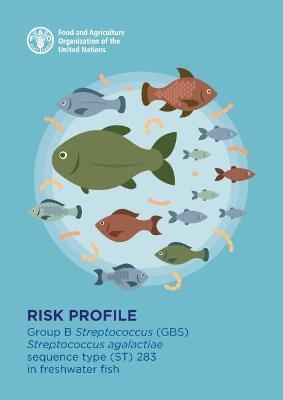
Risk profile
Group B Streptococcus (GBS)Streptococcus agalactiae sequence type (ST) 283in freshwater fish
Seiten
2022
Food & Agriculture Organization of the United Nations (FAO) (Verlag)
978-92-5-134543-6 (ISBN)
Food & Agriculture Organization of the United Nations (FAO) (Verlag)
978-92-5-134543-6 (ISBN)
Assesses the risks of Group B Streptococcus (GBS) along the freshwater fish supply chain, covering wild capture, transport, retail, and consumption. The publication stresses the role of good water quality and good fish husbandry management for reducing GBS disease in fish.
In Singapore during 2015, Group B Streptococcus (GBS) sequence type 283 (ST283) caused the only reported foodborne outbreak of invasive GBS disease. Over 20 percent of cases were healthy adults without comorbidities, which is unusual for GBS. The outbreak was linked to the consumption of raw freshwater fish. Subsequent investigations found that ST283 GBS has been common among GBS causing disease in humans and in tilapia across Southeast Asia for at least 20 years, whereas it was almost non-existent outside this region. Given the novelty of the outbreak, this risk profile consolidates the current knowledge to identify data gaps about GBS ST283 along the freshwater fish supply chain in Southeast Asia. Although GBS fish infection can present with few clinical signs of disease, outbreaks of GBS in high intensity tilapia aquaculture can result in severe infection with mortalities of up to 80 percent. These outbreaks are largely undocumented but likely have a wide effect on aquaculture, given its economic and social importance across Southeast Asia. There is also a lack of data on patterns of fish consumption, including frequency, amount, preparation and consumer demographics. Nevertheless, consumption of non-heat-treated freshwater fish is common in Southeast Asia. Given the multitude of data gaps, the risk posed by GBS ST283 from consumption of freshwater fish remains highly uncertain. Potential risk management options start with the application of good aquaculture practices and good food safety measures throughout the supply chain
In Singapore during 2015, Group B Streptococcus (GBS) sequence type 283 (ST283) caused the only reported foodborne outbreak of invasive GBS disease. Over 20 percent of cases were healthy adults without comorbidities, which is unusual for GBS. The outbreak was linked to the consumption of raw freshwater fish. Subsequent investigations found that ST283 GBS has been common among GBS causing disease in humans and in tilapia across Southeast Asia for at least 20 years, whereas it was almost non-existent outside this region. Given the novelty of the outbreak, this risk profile consolidates the current knowledge to identify data gaps about GBS ST283 along the freshwater fish supply chain in Southeast Asia. Although GBS fish infection can present with few clinical signs of disease, outbreaks of GBS in high intensity tilapia aquaculture can result in severe infection with mortalities of up to 80 percent. These outbreaks are largely undocumented but likely have a wide effect on aquaculture, given its economic and social importance across Southeast Asia. There is also a lack of data on patterns of fish consumption, including frequency, amount, preparation and consumer demographics. Nevertheless, consumption of non-heat-treated freshwater fish is common in Southeast Asia. Given the multitude of data gaps, the risk posed by GBS ST283 from consumption of freshwater fish remains highly uncertain. Potential risk management options start with the application of good aquaculture practices and good food safety measures throughout the supply chain
| Erscheinungsdatum | 14.01.2022 |
|---|---|
| Zusatzinfo | col. ill., col figs, tables |
| Verlagsort | Rome |
| Sprache | englisch |
| Themenwelt | Technik ► Lebensmitteltechnologie |
| Technik ► Umwelttechnik / Biotechnologie | |
| Weitere Fachgebiete ► Land- / Forstwirtschaft / Fischerei | |
| ISBN-10 | 92-5-134543-0 / 9251345430 |
| ISBN-13 | 978-92-5-134543-6 / 9789251345436 |
| Zustand | Neuware |
| Haben Sie eine Frage zum Produkt? |
Mehr entdecken
aus dem Bereich
aus dem Bereich
Technologie, Chemie, Mikrobiologie, Analytik, Bedeutung, Recht
Buch | Hardcover (2023)
Verlag Eugen Ulmer
CHF 169,00


